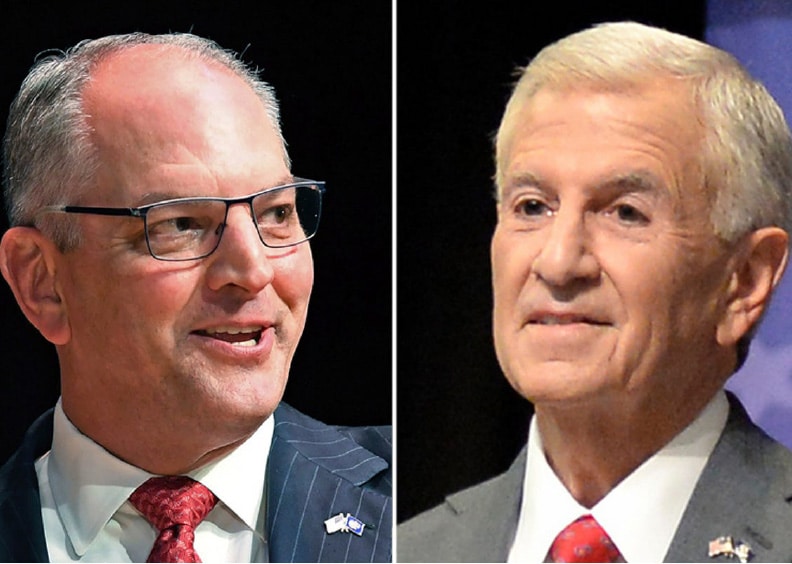The Nexstar television stations in Louisiana released a poll that showed Gov. John Bel Edwards with a slim edge over challenger Eddie Rispone, suggesting “turnout matters a lot more” than many politicos were expecting.

“Given that the undecided percentage is down to 6 percent, this is now an election where turnout matters a lot more than persuasion,” said pollster John Couvillon.
The Nexstar-JMC poll also found Secretary of State Kyle Ardoin in a comfortable position for his runoff election, leading Democrat Gwen Collins-Greenup 48 percent to 32 percent.
The poll included a question on Trump as well, finding his support remains “relatively strong in Louisiana, with a 52 percent job approval rating and 54 percent opposed to the recent inquiry launched by congressional Democrats.”
Fight For Super-Majority In State House
Republicans have already secured a super-majority in the Louisiana Senate following the recent primary elections. But GOP diehards will have to wait until the Nov. 16 runoff elections to learn whether the party has accomplished the same in the House of Representatives.
So far, Republicans have 63 seats in the lower chamber — just seven seats short of a veto-proof super-majority to match the partisan lead enjoyed by the Senate.
According to Michael Henderson, an assistant professor of political communication at Louisiana State University’s Manship School of Mass Communication, there are only seven House runoffs that feature Republican contenders against opponents from a different party, and all of them are located in GOP-leaning areas.
If Democrats want to hold off the super-majority, Henderson predicted the party’s best chance may be in Baton Rouge’s House District 70, where Democrat Belinda Davis is facing off against Republican Barbara Reich Freiberg. The suburban district is an area where President Donald Trump could have performed better and it’s one of only three House districts where a Democrat is running against a non-incumbent Republican, Henderson said.
“There is bad news for Democrats. In the primary, suburban voters did not penalize Republican legislative candidates for Trump the way they have elsewhere in the country,” Henderson said, adding, “there are no easy paths for Democrats through these seven races, but their best chance for a flip appears to be the 70th District.”
If Louisiana’s political class sees it the same way as Henderson, then the end result could be an avalanche of Republican and Democratic dollars into a single legislative district few outside of Baton Rouge were even watching.
In the 2015 primary, Edwards managed to win the most primary votes in 23 rural parishes that former U.S. Sen. Mary Landrieu lost in 2014. While black voters were a driving force in his memorable election, it was also the country vote that helped Edwards cross the finish line. (Those parishes were Jackson, Webster, Avoyelles, Union, Winn, Ouachita, Franklin, Richland, Lincoln, Catahoula, West Feliciana, Washington, Tangipahoa, St. Charles, Livingston, Ascension, St. Mary, Jeff Davis, Calcasieu, Beauregard, Allen, Evangeline and Rapides.)
After the recent primary vote, Rispone has either won or turned competitive 11 of those rural parishes, gathering a total of 116,000 votes to Edwards’ 156,000.
Rispone flipped five parishes outright, including Beauregard, Jefferson Davis, Livingston, Union and Webster. He lost another by less than 100 votes (Allen) and another five by less than 1,000 votes (Ascension, Catahoula, Evangeline, Jackson and St. Mary).
At this point, however, Rispone has merely made this segment of the runoff competitive. He’s down by 40,000 votes in these 23 rural parishes. Moreover, Edwards won Calcasieu, Tangipahoa and Rapides by more than 6,000 votes each and enjoyed a more than 11,000 vote lead in Ouachita.
What’s not factored in here is where the votes of Congressman Ralph Abraham, the race’s third-place finisher from north Louisiana, will go, although it doesn’t take much imagination to see many of them landing at Rispone’s feet.
While every prognosticator around will tell you that Edwards has to increase black turnout in the runoff, these numbers from rural parishes show he has other problems as well. The governor has got to go into these rural parishes and grab the totals he pulled down in 2015.
That’s no easy task along the countryside, where folks have to “drive into town” to vote.
Then again, Edwards remembers those backcountry roads well. (His favorite XM station is Willie’s Roadhouse.) The real question is whether voters there will remember him.
Political History: Edwards (The First) Loses (Sort Of) The Governorship
Thirty-two years ago, three-term Gov. Edwin Edwards lost his throne to then-Congressman Buddy Roemer.
Technically, Edwards didn’t lose anything. He advanced to the runoff with Roemer, although he was trailing 33 percent to 27 percent.
What Edwards did do, however, was resign from the race. That was a better option than getting tossed by voters.
EWE made his decision known that evening, to a crowd of “weeping family and friends,” according to The Shreveport Times.
Two days later The Washington Post published another article with this headline: “EDWARDS CUTS HIS LOSSES.” Here are the first three paragraphs:
“The Edwin Edwards era ended in stunning fashion early this morning when Louisiana’s bon temps governor, reading the long odds against him, withdrew from his reelection race after finishing second in the bipartisan primary behind Rep. Charles E. (Buddy) Roemer III, a young, conservative, reform-conscious Democrat from Shreveport.
“As a result of Edwards’ decision, there will be no runoff in November, and Roemer, who three weeks ago was running last in a five-man race, woke up this morning as governor-elect, preparing for his move next March to the white mansion in Baton Rouge.
“‘It’s absolutely unbelievable. I’m still not over it,’ Roemer said today in a telephone interview from his Shreveport hotel room, referring both to his meteoric rise and the Democratic governor’s unexpected withdrawal. “An era is over, but let’s give Edwin Edwards this much credit: he came in with class in 1971 and he went out with class.”
Edwards wasn’t exactly down for the count. He, of course, made another comeback in 1991, besting David Duke at the polls in the so-called “Race From Hell.”















Comments are closed.